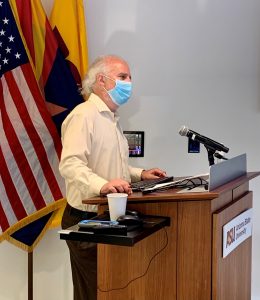
Jacob Kostrzewski, IRLS Program Coordinator, recently sat down with Professor Larry Garber, an election law specialist and adjunct professor at the College of Law, to discuss his distinguished career, the U.S. and International Election Law course he teaches, his work on the upcoming U.S. elections, and advice he has for students.
IRLS Dispatch: What was the most interesting project you worked on or country you worked in during your distinguished career?
Professor Garber: Honestly, it is hard to choose. My five years as the Mission Director in West Bank/Gaza were perhaps the most challenging on multiple levels, but represents more a position than a project. In terms of projects, several of the overseas elections that I was intimately involved with during the 1980s were truly transformational, but if I had to select one election it would be the 1986 Philippines snap election. Not only did it result in the removal by peaceful means of the corrupt Ferdinand Marcos from the presidency, but it also demonstrated the constructive role that serious international election observers could play in documenting and denouncing fraudulent elections. My role was as election adviser to the National Democratic Institute (NDI), which co-organized a 44-person international election observer mission with its Republican counterpart [International Republican Institute].
IRLS Dispatch: You recently led missions to observe elections in Sierra Leone and Zimbabwe. Were those elections free and fair, and are those countries exceptions to, or parts of, the global democratic recession?
Professor Garber: Big differences between the two elections. The Sierra Leone election was contentious and highly contested, but at the end of the day, with a couple of nudges from the international community, the election results showing a victory for the opposition party were respected. Zimbabwe, on the other hand, was a much more problematic election. The ruling party used all the advantages of incumbency to ensure that it retained power. As international observers, our team raised a number of concerns both before and after the process that led to a conclusion that the 2018 elections did not meet the mark. The situation in Zimbabwe, perhaps inevitably in view of the way the election was conducted, has deteriorated considerably since the election and Zimbabwe, despite all its promise, has reverted to a near-basket case economically and a potential failed state politically.
IRLS Dispatch: We are rapidly approaching the 2020 Presidential Election in the U.S. What are the main things you are working on in your role at the Election Reformers Network?
Professor Garber: The Election Reformers Network was established by several former NDI colleagues and me in 2017 as an NGO that sought to apply the lessons that we had learned during our many years of work overseas to the United States. Our major project for the past year has been an examination of the method of selection for the chief election officers in most of the 50 states. Unlike every other democratic country, many states rely on an election based on a partisan competition to select their chief election officer, creating perceived and often real conflicts of interest. While we would like to see alternative mechanisms for selecting chief election officers used in the future, for this year our advocacy efforts have focused on encouraging secretaries of state to recuse themselves from decisions where they or their parties are involved and to decline to participate actively in the campaigns of their parties’ candidates for state or federal offices.
IRLS Dispatch: What lessons that you learned during your career working on elections around the world could and should be applied here?
Professor Garber: There is a whole list of reforms that we are advocating that draw upon our experiences overseas. These include ensuring direct elections for the chief executive (as opposed to relying on the anachronistic Electoral College), establishing independent commissions to draw district boundaries (to avoid political gerrymandering), and legislating serious campaign finance reform (and reversing the pernicious efforts of several Supreme Court decision), and recognizing an explicit right to vote under the federal constitution. All these require amendments to the Constitution, which is always politically challenging, but we hope momentum is building for such much needed reforms.
IRLS Dispatch: What are you looking forward to most about teaching the U.S. and International Election Law class this fall, and what do you hope the students’ main takeaways will be?
Professor Garber: I hope the students come away with an understanding of the many anomalies of the U.S. election system and appreciate the virtues of looking abroad for ideas about how to enhance the quality of U.S. elections.
IRLS Dispatch: What advice would you give to law students looking to enter the election law field?
Professor Garber: The election field is incredibly exciting. While I and many others decry the excessive litigation that now accompanies virtually all elections, I have no doubt that there will much work for election lawyers in coming decades.